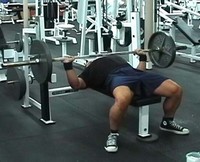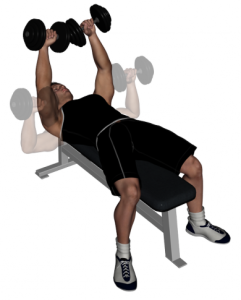Bench press exercises with a barbell or dumbbells are performed a little differently due to differing hand placement and range of motion. But if you had to choose, which one is better? If you’re setting up a new home gym and only have room for one bench or the other (or enough money for one), which should you choose?
Let’s go aover the advantages of either one. This includes the advantage of the bench and the exercise itself.

Advantages to Barbell Bench Pressing:
- More Weight – The bar helps stabilize the weight, so you don’t have to. This means you can pile on more weight without losing control. More resistance means you’re developing more strength or muscle.
- Safety – If your bench has spotter arms on the rack, or better yet if you’re using a separate rack with built in spotter arms, you don’t have to worry about dropping the weight. It will catch the bar. With a dumbbell you don’t have that advantage. Granted, there are some solutions for spotting with dumbbells, but it requires a special setup.
- Other People’s Safety – Do you have a toddler or pet around who could get injured by a dumbbell’s bad bounce off the floor? Or could you damage the wall, door, or knock something over with such a bad bounce?

Advantages to Dumbbell Bench Pressing
- Drop Them – If you can’t complete a rep, it’s pretty simple and safe to drop them or at least bring them in close to your body and kick yourself back up into a sitting position so you can set them down. This is assuming you have plenty of room to do so (see Other People’s Safety, above). If you’re using a barbell without spotter arms available, you could get stuck under the bar after a failed rep and find yourself in an interesting situation.
- Reduce the Risk of Injuries – Arguably dumbbells are better at developing functional strength, which really means a combination of strength, dexterity, etc, that comes into handy in other situations that require body movements that aren’t as simple. Balancing each dumbbell independently helps you train for situations where you’re dealing with force at weird angles.
- Pec Involvement – Dumbbell presses involve the pec (chest) muscles more, as the pecs are what allow you to move the dumbbells closer together as you near the top of your rep.
- Supporting Muscle Development – Similar to the above point, but more to do with developing certain muscles for bodybuilding purposes. Balancing the independent dumbbells is a great way to help build various shoulder muscles, lats, and other supporting muscles, as this GymJunkies article explains. Bodybuilders often use dumbbell work as an accessory to barbell training, because of this.
- Space-Saving – The bench can more often be slid out of the way or tipped into a closet. The dumbbells may or may not be as space-saving, depending on whether we’re talking about a whole set of fixed-weight dumbbells or a pair of adjustable dumbbells.
On a related note, Shane McLeon recommends doing a single-arm dumbbell floor press as an alternative to barbell presses when you have shoulder pain:
Due to the offset load, the single arm floor press will turn on your core and shoulder stabilizers, areas that often get neglected from bilateral bench pressing.
https://barbend.com/bench-press-variations-for-shoulder-pain/
Because it’s performed from the floor, again, it can be friendlier on shoulders because it eliminates the lower half of the press, where the shoulder is externally rotated and where bad things like shoulder impingement can occur.
So as you can see, there are advantages to either one. Both are great exercises. It all depends on your goals, your priorities, and the environment you have available. If you can manage it, think about getting both setups. You will take longer to get bored if you have more to do.
